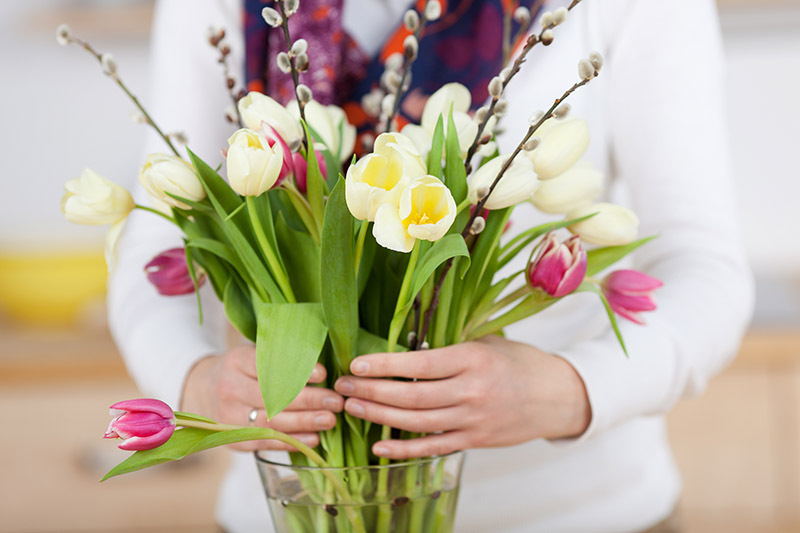Proven Methods to Boost the Longevity of Your Festive Poinsettias
Posted on 02/09/2025
Proven Methods to Boost the Longevity of Your Festive Poinsettias
Poinsettias are synonymous with the holiday season. Their radiant red, pink, or white leaves brighten up homes and offices, making them the quintessential winter decor plant. However, many people struggle to keep these beautiful plants thriving past the New Year, with leaves yellowing or dropping prematurely. The good news is that with a few proven care techniques, you can significantly extend the life and vibrancy of your festive poinsettias. In this comprehensive guide, discover actionable tips and detailed strategies to boost the longevity of your poinsettia plants and keep them lush well into the new year.
Understanding Your Festive Poinsettia
Poinsettias (Euphorbia pulcherrima) are native to Mexico and Central America, thriving in warm, bright environments. Their iconic and colorful "flowers" are actually bracts, modified leaves that surround the plant's tiny yellow true flowers. To keep your festive poinsettias vibrant and healthy, you need to replicate their natural environment as closely as possible.
Why Do Poinsettias Lose Their Beauty?
- Improper Watering: Both under-watering and over-watering can cause leaf drop and root rot.
- Insufficient Light: Without adequate light, poinsettias become leggy and dull.
- Temperature Fluctuations: Cold drafts and sudden temperature changes can stress the plant.
- Dry Air: Indoor heating can lower humidity, leading to curled and dry leaves.
Understanding these factors is key to tackling the root causes of premature poinsettia decline and unlocking the secret to increased poinsettia lifespan.

How to Prolong the Lifespan of Poinsettias: Expert Tips
Boosting the longevity of your festive poinsettias involves replicating their ideal growing conditions and optimizing your care routine. Here are the most proven methods to keep your poinsettia looking beautiful for weeks (or even months) past the holidays.
Choose a Healthy Poinsettia from the Start
- Inspect Leaves and Bracts: Select a plant with undamaged, firm, and vibrant leaves and bracts. Avoid any with wilting or yellowing foliage.
- Check for Yellow Flowers: The true flowers (in the center of bracts) should be tightly closed and yellow-green. Open or dropping flowers indicate older plants.
- Assess Soil Moisture: The potting soil should be slightly damp -- not soggy or dry.
By starting with the healthiest available plant, you increase your odds of prolonging the life of your holiday poinsettia.
Provide Proper Lighting
Poinsettias require bright, indirect sunlight for at least 6 hours per day. Place your plant near a sunny window, but protect it from direct afternoon sunlight, which can scorch leaves.
- Ideal Locations: East- or west-facing windows with filtered light are best.
- Rotate the Pot: Turn your poinsettia every few days to ensure even growth and color development.
Avoid placing your poinsettia near drafts, heaters, or radiators, as sudden temperature changes shorten its festive lifespan.
Watering Wisely: The Key to Long-Lasting Poinsettias
Proper watering is crucial to maximizing your poinsettia's longevity. Follow these tips:
- Water Thoroughly but Infrequently: Wait until the top inch of soil feels dry before watering. Water until it drains from the pot's bottom.
- Avoid Standing Water: Remove decorative foil or poke holes in it to prevent water from pooling around the roots, which causes rot.
- Consistency Matters: Stick to a regular watering schedule, avoiding large fluctuations.
Over-watering is a leading cause of drooping or dying poinsettias. Err on the side of caution: it's always better to under-water slightly than to over-water.
Maintain Optimal Temperature and Humidity
Poinsettias are sensitive to cold and rapid temperature shifts. For the best longevity:
- Keep Temperatures Stable: Daytime temperatures between 65°F - 70°F (18°C - 21°C) are ideal; nighttime temperatures can drop to 60°F (15°C), but avoid anything lower.
- Shield from Drafts: Avoid placing near cold windows, exterior doors, or heating vents.
- Boost Humidity: Poinsettias thrive in moderately humid environments. Place a tray of water and pebbles beneath the pot or use a humidifier to counteract dry indoor air.
Suboptimal temperatures and dry air are common holiday culprits behind poinsettia wilt and leaf loss.
Feed for Longevity: Fertilizing Your Poinsettia
Your festive poinsettias don't need fertilizer while they are flowering. However, if you wish to keep your plant past the holiday season and encourage future blooming:
- Feed with a balanced, all-purpose houseplant fertilizer once blooming has finished and new growth begins (usually in late winter or early spring).
- Follow package directions for dilution; over-fertilizing can damage roots and bracts.
This step is particularly important if you intend to keep your poinsettia as a year-round plant.
Maximizing Festive Poinsettias Longevity: Additional Proven Techniques
Beyond the basics, there are several extra steps you can take to ensure your holiday poinsettias last longer and stay dazzling.
Careful Handling and Placement
- Handle with Care: Bracts and stems are delicate and easily damaged. Avoid bumping or brushing against your poinsettia.
- Protect from Ethylene Gas: Keep the plant away from ripening fruits and vegetables (especially apples and bananas), which emit ethylene that accelerates leaf drop.
Pruning for Perfection
- Deadhead Spent Blooms: Remove dying leaves or bracts to improve air circulation and prevent disease.
- Trim Leggy Growth: In late winter or spring, cut back stems to 4-6 inches to encourage bushier new growth.
Pruning keeps your plant attractive and encourages long-term health and renewed blooms.
Pest Prevention and Management
Poinsettias can sometimes attract whiteflies, spider mites, and aphids.
- Inspect Regularly: Check undersides of leaves for insects or sticky residue.
- Natural Treatments: Wipe pests off with a damp cloth or use insecticidal soap as directed.
Preventing pest infestations is key to keeping holiday poinsettias thriving longer.
Advanced Methods: Re-Blooming Your Poinsettia for Next Year
With attentive care, you can enjoy your poinsettia for years and even encourage it to re-bloom for next holiday season. Here's a detailed schedule proven by plant experts:
Spring and Summer Care
- After the Holidays: When color fades, cut stems back to 4-6 inches. Continue bright, indirect light and careful watering.
- Spring: Repot in fresh soil if necessary. Place outdoors in filtered sunlight once temperatures reliably stay above 50°F (10°C) and continue watering and monthly feeding.
Fall Light Control for Reblooming
- Starting in Late September: Poinsettias need 14-16 hours of complete darkness each night (closet, box, or black plastic bag) and bright light during the day to trigger colorful bracts.
- Continue for 8-10 Weeks: After 8-10 weeks of this regime, bracts will begin to color up just in time for the holidays!
Note: This process requires discipline but is the most effective way to make your festive poinsettia rebloom every holiday season.
Common Mistakes That Shorten Poinsettia Longevity
- Placing Poinsettias in Drafty or Dark Locations
- Overwatering, Leading to Root Rot
- Ignoring Signs of Pest Infestation
- Neglecting to Remove Decorative Foil So Excess Water Can Drain Properly
- Exposing Plants to Extreme Temperature Changes
Avoid these pitfalls to ensure your festive poinsettias remain vibrant and long-lasting.
Bonus: Myths About Poinsettia Poisonousness
Poinsettias have an undeserved reputation for being highly toxic. While it's best to keep them out of reach of children and pets due to potential mild irritation, studies show the toxicity is overstated. Ingestion may cause mild digestive upset, but poinsettias are not fatal or severely poisonous. Still, prioritize safe placement to prevent accidental chewing or ingestion.
Recap: The Best Proven Methods to Boost Poinsettia Longevity
- Buy healthy plants with pristine leaves and few open flowers
- Provide bright, indirect sunlight and maintain consistent temperate
- Water when soil is dry to the touch but don't overwater
- Maintain humidity and avoid drafts
- Feed after blooming if you plan to keep your poinsettia long-term
- Prune and check for pests regularly
- Try the reblooming technique for next year's holidays
By implementing these proven methods, your festive poinsettias can thrive and remain an eye-catching part of your holiday tradition for months -- or even years -- to come.

Frequently Asked Questions
How long do holiday poinsettias typically last?
With optimal care, poinsettias can remain beautiful for 4-8 weeks indoors. When cared for year-round, they can live for many years and rebloom each season.
What is the best temperature for poinsettias?
Poinsettias thrive at 65°F-70°F (18°C-21°C) during the day, with a slight drop at night. Avoid exposing them to temperatures below 50°F (10°C).
Can I plant my poinsettia outdoors?
In frost-free climates, mature poinsettias can be planted in partial sun outdoors after the danger of frost has passed. In colder areas, enjoy them as houseplants.
Conclusion
Poinsettias are arguably the most iconic holiday plants, but keeping them healthy and vibrant requires informed, consistent care. By following these proven methods to boost the longevity of your festive poinsettias, you'll not only enjoy their beauty throughout the holiday season but will also have the satisfaction of nurturing a living piece of holiday tradition year after year. Remember, a happy poinsettia is a cherished symbol of warmth, celebration, and good cheer. With the right knowledge and attention, your festive poinsettias can truly last long past the final chorus of "Jingle Bells."
Latest Posts
Let Nature Reveal Your Perfect Flower Persona
Peony Flowers Decoded: What Each Colour Represents in Culture and Tradition
Perfect Flowers to Send for a Loved One's Birthday
Exploring 7 Intriguing Facts About Tulips You Didn't Learn in School
8 Hidden Facts About Sunflowers That Will Change How You See Them






